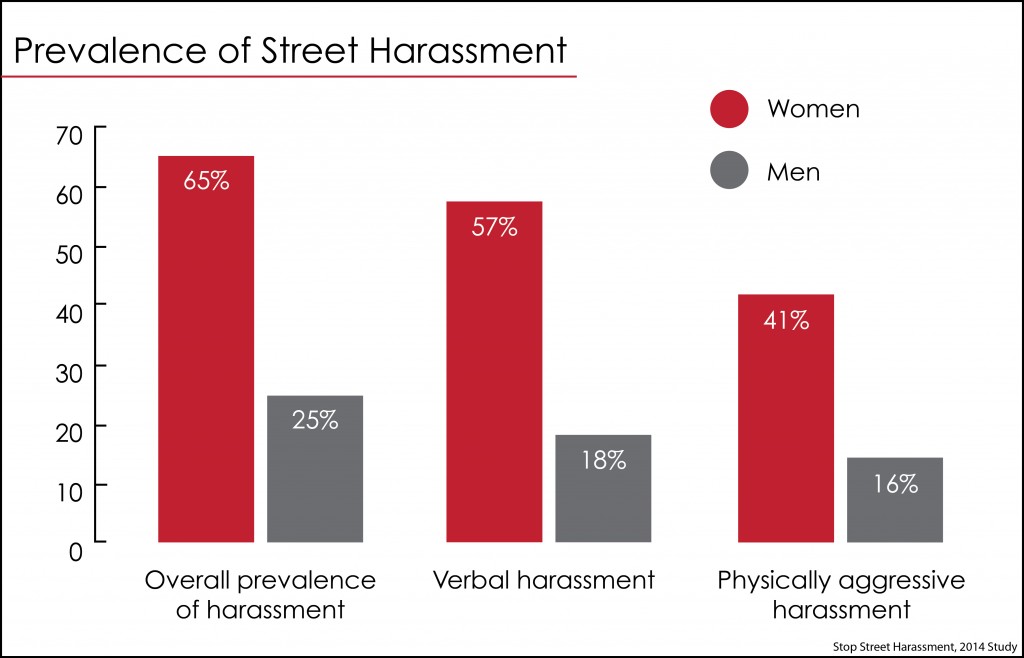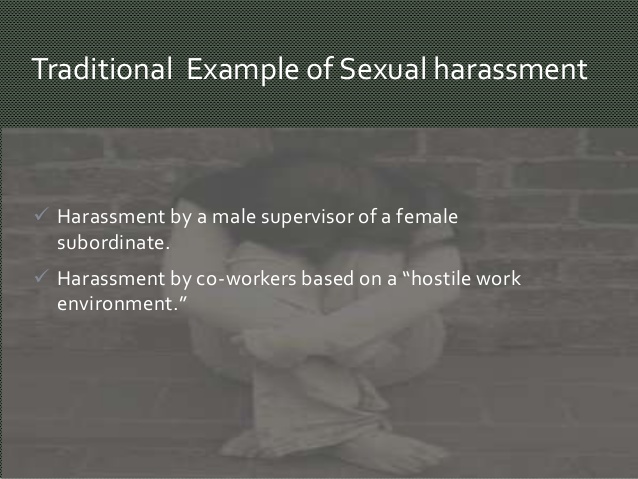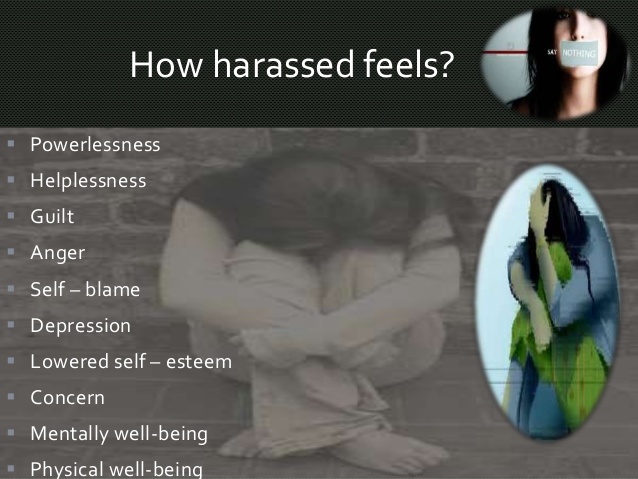 Our Youth Icon
Our Youth Icon
|
|
Sr. |
About Our Youth Icon |
Next Gener..... |
|
1. |
Vikas Padwal
...He i Clever Student... a Rockstar Dancer..with Professional Trainer.. Fight
against Womn..Harass..T |
|
|
2. |
Pooja Girhe....She is Topper Student on the way I.P.S.Kiran Bedi and Fight against Womn..Harass..T |
|
|
विशाखा मार्गदर्शक तत्त्वे --- Vishaka Guidelines
Marathi
Hindi
English
|
विशाखा मार्गदर्शक तत्त्वे ही भारताच्या सर्वोच्च न्यायालयाने स्त्रियांचा कामाच्या
ठिकाणी होणार्या लैंगिक छळाच्या अनुषंगाने घालून दिलेली काही मार्गदर्शक तत्त्वे
आहेत. भँवरीदेवी या राजस्थानमधील महिलेवर काम करत असताना झालेल्या लैंगिक
अत्याचाराच्या घटनेनंतर सर्वोच्च न्यायालयाने इ.स. १९९७मध्ये सर्व आस्थापनांना काही
सूचना दिल्या. 'विशाखा मार्गदर्शक तत्त्वे' नावाने ओळखल्या जाणाऱ्या या सूचना सर्व
कार्यस्थळे, जिथे महिला काम करतात त्यांना लागू आहेत. यामध्ये कामाच्या ठिकाणी
होणारा लैंगिक छळ म्हणजे काय वा त्याअंतर्गत कोणकोणत्या बाबींचा समावेश होतो याच्या
व्याख्या व मार्गदर्शक तत्त्वे देण्यात आलेली आहेत.
नोकरी वा व्यवसायाच्या ठिकाणी महिलांची लैंगिक छळवणूक होऊ न देण्याची जबाबदारी ही मालकाची अथवा संबंधित अधिकारी वा व्यक्तीची असेल.
सर्व सरकारी व निमसरकारी अथवा खासगी कामाच्या ठिकाणी "लैंगिक छळवणूक" म्हणजे काय, याची माहिती कामकाजाच्या ठिकाणी लावण्यात यावी व सर्व कर्मचार्यांपर्यंत ती पोचेल, अशी व्यवस्था करावी.
जर लैंगिक छळवणुकीची घटना ही फौजदारी गुन्हा होत असेल, तर संबंधित अधिकार्यांनी योग्य त्या ठिकाणी याची तक्रार तर नोंदवावीच; पण त्याचबरोबर पीडित महिलेस सर्व सुरक्षा पुरवावी.
पीडित महिलेस तिच्या इच्छित ठिकाणी बदली करून द्यावी व संबंधित आरोपी कर्मचार्याविरुद्ध नियमाप्रमाणे शिस्तभंगाची कारवाई सुरू करावी.
सर्व सरकारी, निमसरकारी, खाजगी तसेच सार्वजनिक क्षेत्रातील कार्यालयात महिलांच्या होणार्या लैंगिक शोषणाची तक्रार ऐकून निवाडा देण्यासाठी एक तक्रार निवारण मंच वा समिती असावी व त्यात ५० टक्के सदस्य महिला असाव्यात, स्वयंसेवी महिला संघटना, महिला आयोग यांचे प्रतिनिधी असावेत, तसेच कायदेतज्ज्ञ, तक्रार करणारी स्त्री व ज्याच्याविरुद्ध तक्रार आहे तो पुरुष या दोघांच्याही खात्याचे प्रमुख त्या कमिटीत असावेत व स्त्रियांनी या कमिटीकडे आपली तक्रार मांडावी.या मंचापुढे जेव्हा एखादी महिला आपल्या शोषणाबद्दल लेखी तक्रार करेल, तेव्हा समितीचे सदस्य तिची तक्रार व दोन्ही बाजूंचे म्हणणे ऐकून घेतील. सर्व रेकॉर्डस् तपासतील. याद्वारे सत्यशोधनाचा प्रयत्न करतील व दोषी ठरलेल्या कर्मचार्याची पगारवाढ थांबवणे किंवा त्याची शिक्षा तत्त्वावर बदली करणे, अशा प्रकारच्या शिक्षा देऊन प्रश्न सोडविण्याचा प्रयत्न करतील. येथेही महिलेला न्याय न मिळाल्यास ती राज्य महिला आयोग किंवा न्यायालयात दाद मागू शकेल.
जर एखाद्या नोकरदार महिलेने बाहेरील व्यक्तीविरुद्ध कामकाजाच्या ठिकाणी लैंगिक छळवणुकीची तक्रार केली, तर अशा व्यक्तीविरुद्ध जरूर ती सर्व कायदेशीर कारवाई करण्याची व पीडित महिलेस सर्व मदत करण्याची जबाबदारी ही मालकांवर वा अधिकार्यांवर राहील.
केंद्र व राज्य सरकारने याबाबतीत योग्य ते कायदे व उपाययोजना कराव्यात.
|
|
पार्श्वभूमी
|
|
इ.स. १९९० साली राजस्थानमध्ये काही उच्चजातीय जमीनदारांनी
भँवरीदेवी या दलित महिलेवर सामुदायिक अत्याचार केला.राजस्थान सरकारच्या
योजनेअंतर्गत अल्पवयीन मुलींचा विवाह करु नये म्हणून भँवरीदेवी गावकर्यांचे प्रबोधन
करण्याचे काम करत होती. मात्र गावच्या जमीनदारांना ते रुचले नाही व त्यांनी भँवरीवर
अत्याचार केला. न्याय मिळविण्यासाठी तिने न्यायालयाचे दरवाजे ठोठावले परंतु
न्यायालयाने तिच्या विरोधात निकाल दिला. दलितांना उच्चजातीय शिवत नाहीत त्यामुळे
उच्चजातीय जमीनदारांनी दलित भँवरीवर अत्याचार करणे शक्य नाही असे न्यायालयाने
आपल्या निकालात म्हटले. या निकालाच्या पार्श्वभूमीवर स्त्रियांसाठी काम करणार्या
विशाखा नावाच्या महिला स्वयंसेवी संघटनेने विशाखा नावाने सर्वोच्च न्यायालयात
जनहितार्थ याचिका दाखल केली. या याचिकेवर इ.स. १९९७ साली सर्वोच्च न्यायालयाने
जो निकाल दिला तो निकाल म्हणजेच विशाखा निकाल किंवा विशाखा मार्गदर्शक तत्त्वे होत. |
|
मार्गदर्शक तत्त्वानुसार लैंगिक छळाची व्याख्या |
विशाखा याचिकेवर निकाल देताना सर्वोच्च न्यायालयाने कामाच्या ठिकाणी होणारा लैंगिक छळ याची दिलेली व्याख्या अशी आहे -
- कोणताही अस्वागतार्ह शारीरिक स्पर्श
- शरीरसंबंधांची मागणी किंवा विनंती
- कोणत्याही स्वरुपातील संभोगवर्णन वा अश्लील साहित्य दाखविणे
- लैंगिकता सूचक शेरे मारणे वा अश्लील बोलणे
- कामूक वा अश्लील चित्रे दाखवणे किंवा एसएमएस, ईमेल करणे
- लैंगिकता सूचक कृती, शारिरीक, मौखिक किंवा नि:शब्दपणे केलेली अन्य कोणतीही कृती
|
|
|

|
|
if We won't Stand up for Ourselves,Nobody will.. |

|
 Some Glance on Harassement... Some Glance on Harassement...  |

|

|

|
|
Sr. |
How to Stop Sexually Harassing Women |
View/Download |
|
|
|
|
|
1. |
Womans Harassement at workplace.. |
|
|
2. |
laws-in-place-to-prevent-harassment-of-women-but-of-what-use |
|
|
3. |
Guide on Prevention of Sexual Harassment in the Workplace |
|
|
4. |
Womens Human Rights: A Fact Sheet.... |
|
|
5. |
Equality and women’s economic, social and cultural rights... |
|
|
6. |
Women’s Rights are Human RightsAttaining equality between women and men |
|
|
7. |
Stop Violence Against Women Sexual Harassment |
|
|
8. |
Effects of Sexual Harassment |
|
|
|
|
|
|
do not sexually harass women in your workplace or public life. |
|
|
While anyone can suffer sexual harassment, women disproportionately bear the
brunt of it. In 2006, 85% of all sexual harassment claims in the US were made by
women. The European Foundation for the Improvement of Living and Working
Conditions has found that the problem “particularly affects women.”Many,
however, are unaware that their behavior may constitute sexual harassment.[2]
Obtaining a better understanding of this phenomenon and how you can stop it will
ensure that you do not sexually harass women in your workplace or public life. |
|
|
1 Review your company’s policy on sexual harassment. In the US, Title VII of the
Civil Rights Act of 1964 has made sexual harassment illegal in the workplace.[3]
Various state laws may also reinforce or work in conjunction with the national
law. You can be guilty of sexual harassment even if you are not in a management
or authority position.[4] If you sexually harass someone in the workplace, you
may open yourself up to lawsuits against you from either the harassed woman or
from your employer for putting them at risk and tarnishing their image. While
specific company policies vary, none tolerate sexual harassment, which is
grounds for discipline up to and including dismissal. |
|
|
End benign sexual harassment. Pet names or complimentary epithets may seem like
harmless fun, but they are a virulent form of sexual harassment. You might even
believe that women enjoy and appreciate such benign sexual harassment. They
don’t. Refer to women in the workplace only by their names. Some gendered
referents to avoid include: Honey Sweetie Baby Darling Sweet cheeks |
|
|
Do not ask your coworkers out. While one time will probably not be considered
sexual harassment, repeated attempts most certainly will. If a woman is not
interested in dating you, accept her decision and do not pursue a relationship
with her. Even if this didn’t constitute a form of sexual harassment, it’s
pretty dumb. Work relationships rarely last and when you break up, you will have
to confront your ex every day at work. Don’t do it. |
|
|
Do not touch your female coworkers. Hugs, back rubs, even slight nudges or taps
to the arm could be considered sexual harassment.[5] Any contact between you and
a female coworker could get you in trouble. Keep your hands in your pockets, at
your sides, behind your back, or clutching something (a report, a book, a coffee
mug) when you interact with women workers to ensure they are not subject to
sexual harassment. |
|
|
Create a friendly, welcoming work environment. Talking about the physical
attributes of women in your workspace or of women in general are common forms of
hostile work environment sexual harassment. Do not make comments either
disparaging women’s physical qualities (such as “She’s so fat”) or admiring them
(as in, “She has a great body”). Making comments which are offensive to women
(especially referring to a woman as a “bitch”) or which reinforce gender
stereotypes (“All women want to be mothers” or “Women are no good at math and
science”) should also be forbidden.[6] Keep your personal opinions on women to
yourself.
A hostile work environment might also include descriptions of sexual acts. When
you’re on the clock, leave bragging about your sexual exploits for a more
appropriate time. Gender equity in the workplace requires not only eschewing
negative or objectifying comments about women, such as “Women don’t know
anything,” or “Women are only good for one thing,” but creating an environment
in which women and men feel they have positive ideas to contribute. Encourage
management to include more positive images of women in your company’s
promotional materials and introduce more women into the management team and
labor force. |
|
Ending Sexual Harassment in Public |
|
|
Don’t catcall. A catcall could be whistling at, making kissing sounds at, or
lobbing uninvited comments in a woman’s direction while she is walking about,
minding her own business. “Hey, beautiful,” or “What are you doing later,
sweetheart?” are examples of comments you should keep to yourself.[7] If you see
an attractive woman walking around, go about your business and leave her alone. |
|
|
Don’t stare. Don’t leer. Don’t make that gaping-mouthed, wide-eyed caveman face.
If a woman is walking towards you, do not assume it is because she wants to talk
to you. She has somewhere to be and should be allowed to reach her destination
without being subjected to your unwanted gaze. Staring is creepy, irritating,
and gross for the woman in question.[8] If you feel your eyes fixating on
someone, just close your eyes or look away. |
|
|
Keep your hands to yourself. When you’re in a bar or club, sexual harassment
often takes the form of unwanted touching or groping. When alcohol is involved,
the likelihood that women will be confronted with unwanted sexual attention
increases. Understand that just as you have a right to dance and drink in public
without being accosted, so to do women. If they rebuff your advances or are
unreceptive to your invitations to drink and dance, do not try to coerce them by
grabbing them by the arm, around the waist, or engaging in other forms of
unwanted touching. Be respectful of women’s wishes and demands at all times. If
you find liquor leads you to sexually harass women, try drinking at home with
your friends. |
|
|
Don’t make jokes about women’s bodies or capabilities. The most infamous of this
category are so-called “blonde jokes,” whose punchline always drives home that
women with blonde hair are stupid.[9] This kind of gendered humor constitutes
sexual harassment. Other jokes about women revolve around a variety of other
traits traditionally considered feminine, such as cooking, cleaning, or caring
for children. If a joke is at the expense of a woman’s integrity or feelings,
don’t tell it. There are plenty of funny jokes which don’t turn women into the
punchline. |
|
|
Don’t hang out with friends who like to harass women. Misogynists and male
chauvinists see no problem with sexual harassment. They think it is their right
to touch or talk about women in whatever ways they want. By being with them, you
are more likely to internalize and tacitly approve this behavior as acceptable.
But when you choose not go out with them, you can take the opportunity to
explain that you’re doing so in order to work towards a new life built on
respect for, empathy with, and understanding of women. Hopefully your example
will make them consider their behavior too. Be firm when expressing your disdain
for harassment. Look your friends in the eye so they know you are not joking.
Examples of things you can say to chastise your male chauvinist friends include:
How would you like it if people treated you like an object? She's not a dog,
don't whistle at her.[10] What makes you think this kind of behavior is
acceptable? |
|
Changing Your Attitudes to End Sexual Harassment |
|
|
Question your motives. What are you gaining in your sexually harassing
behaviors? Better understanding why you feel sexual harassment is necessary will
help you find a solution for your behavior and refocus your energy in a more
productive way. Examine your reasons for sexually harassing women. Do you want
to look good in front of your buddies? Perhaps you need new friends, or give
your old friends a heads-up about why sexual harassment is wrong. Does it make
you feel strong, powerful, in control? Your insecurity is no excuse for sexual
harassment. Talk to a therapist if you struggle with the need to feel “manly” or
“tough.” Do you feel entitled to touch or talk about a woman's body without her
permission? This is a symptom of male privilege, the ability of men to do and
say things that women cannot because society judges people of different genders
with different yardsticks. Consider how you would feel if someone touched and
tried to coerce you into something you did not want to do. Whatever your reason,
ask why you think it’s acceptable and find a way to undermine the assumptions
upon which you’ve justified sexual harassment. |
|
|
Understand the consequences of sexual harassment. There are consequences for you
and consequences for her. There can be emotional, physical, or legal
repercussions for sexual harassment depending on the severity and specific
circumstances of the situation. Some of these consequences include: You may
later feel embarrassed when you realize how rude you’ve been.[11] In addition to
negative feelings, you may open yourself up to legal action, especially in the
case of ongoing sexual harassment of one individual. Women who experience sexual
harassment feel angry, trapped, and frustrated.[12] Victims of sexual harassment
will feel less safe and often have to adjust their travel routes and schedules
in order to avoid certain times of the day (especially late at night) or certain
places (near bars, colleges, and restaurants) where sexual harassment is a
frequent occurrence. Cultural acceptance of sexual harassment leads to rape,
domestic violence, and other forms of female disempowerment which women around
the world have to confront daily. |
|
|
Empathize. Imagine you are one of the one in four women who experience sexual
harassment in the street before the age of 12 (or one of the one in two women
harassed on the street by age 17).[13] How would you feel? Victims of sexual
harassment often describe the experience as one in which they feel powerless,
afraid, angry, and alone. Stop believing the lie that women enjoy harassment.
Just because she smiles doesn't mean she likes it; in fact, a smile is most
likely a fear response in the hopes that the situation won’t escalate into
threats, violence, stalking, rape, or murder. Sexual harassment threatens a
woman's sense of safety, and it is never okay. Use the following guiding
questions to think carefully about life as a woman under the constant threat of
sexual harassment: Would you like to worry about what you are wearing before
going out because you might be "asking for it?" What would it feel like to live
according to a "rape schedule" – leaving bars and other venues early to ensure
you are not alone in the parking lot after dark? Do you think your sister,
mother, or female friends would appreciate catcalls, staring, or unwanted
groping? Would you? |
|
|
Discipline yourself. Changing habits is hard. Motivate yourself to stop the
harassment. Wear a rubber band around your wrist and lightly snap it against
your wrist when you feel the urge to harass. Have a stress ball in your pocket
to distract yourself when you're feeling the urge to touch someone
inappropriately. Conversely, when you go for a week without making a sexual
comment or joke which might make women feel awkward or uncomfortable, give
yourself a pat on the back and a little reward. As time goes on and you become
more sensitive to the reality of sexual harassment, elongate the period of time
you wait to reward yourself for speaking and acting free of sexual harassment. |
|
|
Make amends. Give a detailed verbal apology to any woman you realize you were
harassing. Explain that you now realize the error of your ways, and have learned
that women deserve respect.[14] A display of penitence will make the women you
harassed feel somewhat better, and after a big apology, you will think twice
about making lewd comments, |
|
|